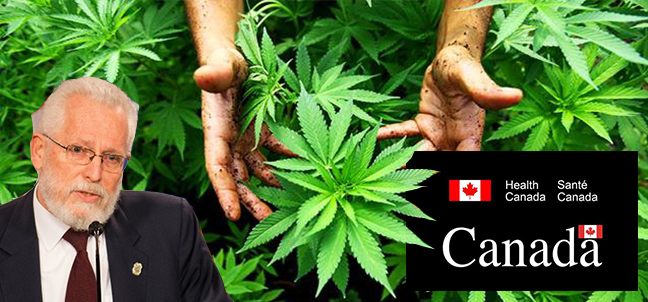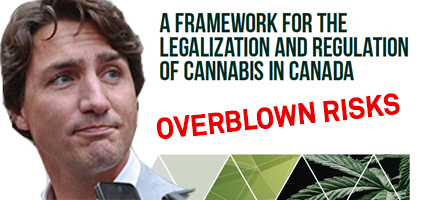What the Judge Said on Patients’ Rights, and What Health Canada Can Do Next
Judith Stamps
Canadians who are ill, and who believe they are obtaining relief from cannabis, have a constitutionally protected right to grow their own medicine. So said Justice Michael Phelan of the BC Federal Court on February 24 2016. At least that’s how I read it. Based on evidence presented by plaintiff Neil Allard and three other Canadian patients, as well as through written presentations by criminology professor Susan Boyd, president of CAMCD Jamie Shaw, and others, Phelan struck down Health Canada’s MMPR. The MMPR, for those new to the subject, allowed patients to buy by mail order only from about 29 federally licensed Canadian producers. In 2014 the MMPR replaced the MMAR, regulations that had allowed patients to grow for themselves, or to appoint someone to grow for them. The judge has given Health Canada six months to give patients a better system. The Trudeau government could appeal the decision, but as the defense’s case was poor, an appeal seems unlikely—one hopes. Truth to be told, the Liberal Health Canada is a stranger.
In any case, this is what the judge said.
1. There is a paucity of scientific evidence on medical cannabis. In the absence of scientific evidence, patient anecdotes are an acceptable substitute. Patient testimony is therefore accepted as true. More generally, cannabis is accepted as having medicinal value. (I may be mistaken, but I think that’s a first, both on the subject of anecdotes, and on cannabis as a medicine. Perhaps like many of us, Justice Phelan spent one too many days having to listen to Health Canada under Harper.)
2. It is accepted that some patients need access to particular strains that they grow for themselves, and whose supply cannot be guaranteed by an MMPR-like system. (Actually, I’m not sure such supply can be guaranteed by any market system.) It is accepted that home growing is cost effective, and that some patients cannot afford what is on the market. It is accepted, in addition, that there is therapeutic value in having a personal garden. (Recognizing both the need for particular strains, and the therapeutic value of growing them has to be a first as well. This judge is our friend.)
3. ONE HAS TO BE LOGICAL. The law forbidding home gardens was premised on the idea that home gardens are unsafe both for patients and the general public. But there is no factual basis for this idea. It is possible, in a regulated system, for patients to grow cannabis at home safely. Thus to deny them the right to grow is arbitrary.
4. Similarly, the MMPR was put in place ostensibly to improve patient access to medical cannabis. But it did the opposite. The MMPR was meant to increase patient safety. Instead, it caused patients to live in fear of arrest and prosecution. These facts, too, make the MMPR arbitrary.
5. Patient access to medical cannabis has to be a primary concern of any future lawmakers. (That’s a clear order to Health Canada, to take off the 3-D prohibition glasses.)
Given these points, what can Health Canada do? Here is what it cannot do. It cannot forbid medicinal home gardens. And it cannot force patients to buy what they can ill afford. So it cannot rely solely on an absurdly expensive to run, mandated set of suppliers.
It cannot restate the idea that home growing is dangerous. Neither it nor its expert witnesses have factual records to show that this notion is true. It cannot to stick with its previous claims that cannabis is not a medicine. The BC Federal Court accepts that cannabis has medicinal value. It cannot rant about the weaknesses of anecdotal evidence. The court has accepted this evidence.
Justice Phelan noted that under the MMAR, Canadian patients were accorded a calculated daily allowance that is high by international standards —18.22 grams/day. Other nations, Israel and The Netherlands, for example, allow 3-5 grams/day. Why this is the case, he says, is unknown to the court, and any reasons offered have been “highly speculative.” But he raised no alarm, and made no suggestion that this allowance needs to be revisited.
It is widely known that the generous growing allowance produces a surplus, and that this surplus is sold through medical cannabis dispensaries. If Justice Phelan understands how this works he didn’t say. But he did say that he took seriously Jamie Shaw’s written testimony that the dispensaries have been the “heart” of access for most patients. He didn’t go so far as to say: I ‘heart’ dispensaries. But he might just as well have. Enhancing access was his main goal. And of course, city councils here and there are beginning to license dispensaries. So unless I’m mistaken, dispensaries have just moved another step toward to legitimacy; Health Canada would be hard pressed to try ordering them to shut down.
But it cannot un-license or otherwise eliminate the LPs either.
So within the allotted six-month time limit, these are the moves open to Health Canada. It will not be able to reinvent everything, and will have to make use of systems already in place.
1. Re-institute the MMAR or something like it. Re-instate growing rights arbitrarily taken away from some MMAR growers, and allow new patients to apply. On this matter, Health Canada has little choice.
2. Re-institute the right to grow, regulate it, but reduce the allowable number of plants, perhaps with an eye to starving dispensaries of supply. I can see the last regime trying that. Such a policy, however, would encourage more unregulated supply, hardly a step toward safety.

3. Accept and recognize the value of dispensaries, and allow city councils to regulate them. Recognize that the MMAR/dispensary system serves patients well, and harms no one.
4. Or let patients grow, say nothing at all about dispensaries, and just leave them alone. But that is a cruel option, as it leaves dispensaries vulnerable to police harassment.
5. Allow the LPs to market their products through the pharmacies that wish to sell them, or through dispensaries that are willing to accept them, or to the American or any other foreign market, if that can be arranged.
6. Allow and encourage the LPs and the MMAR/dispensary systems to explore ways to work together. Let those who are willing be friends and trading partners.
7. Cultivate good will. Institute a program designed to educate doctors on cannabis medicines, set aside funds for research, and conduct some research. Show some humility, and engage in self-education.
Anything more stringent than the above will drive the industry further underground, start more court challenges, and make Health Canada look as fervently biased and incompetent as some of its expert witnesses. Rona Ambrose didn’t seem to mind looking fervently biased, but the current minister, Jane Philpott, might.
We don’t know this new government. They campaigned on the idea of liberalizing cannabis laws, but thus far one hears nothing on what this idea means. Will the new Health Canada show compassion and liberality? Will it demonstrate an understanding of cannabis as medicine, or of patients’ needs? Will it recognize the expertise of medical cannabis activists? Will it show respect for the courts? If it can’t do any of these, we will see more absurdity… in the short run, anyway. Attitudes are changing. Laws on medical cannabis are bellwether to cannabis laws in general. The next six months will tell us if this newly elected crew has brought with it a new spirit, or is just trying to look trendy.






